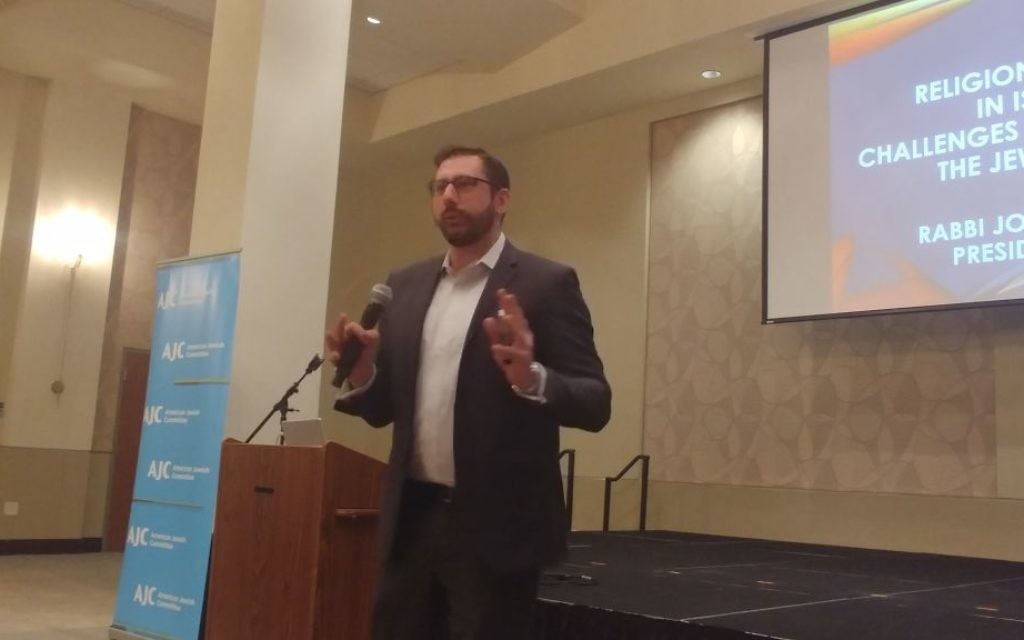Reform Movement Fights for Israeli Awareness
What Americans know as Reform, Conservative or liberal Judaism is unrecognizable to most Israelis.
Debates about Israel’s relationship with the Diaspora, its stance on pluralism and the Reform movement’s ability to attract people have grown heated at times this year.
Prime Minister Benjamin Netanyahu’s government angered non-Orthodox Jews outside Israel by suspending an agreement on an egalitarian space at the Western Wall and pushing legislation to strengthen ultra-Orthodox authority over conversions within the Jewish state.
Rabbi Josh Weinberg, the president of the Association of Reform Zionists of America, addressed the status of religious pluralism at an American Jewish Committee program, “Being Jewish in the Jewish State — Religious Equality in Israel Today,” Thursday, Dec. 14, at Temple Sinai.
Get The AJT Newsletter by email and never miss our top stories Free Sign Up
What Americans know as Reform, Conservative or liberal Judaism is unrecognizable to most Israelis, so the Reform movement invites Israelis to the United States, Rabbi Weinberg said. “We are helping to bring Israelis and shlichim to our summer camps, synagogues and youth movements so they can say, ‘Oh, wow, this is actually nice.’”
But religion and politics mix in Israel. Rabbi Weinberg cited the example of Yaakov Litzman, who resigned as health minister in November over the issue of trains running on Shabbat, something his rebbe from the Gur Hasidic sect said was non-negotiable.
The ultra-Orthodox are crucial for Netanyahu to hold together his coalition’s slim Knesset majority, Rabbi Weinberg said.
“Sometimes we like to think that everything the Haredim do is related to us. It’s not. The Haredim are also experiencing tremendous tumult right now,” he said.
Rabbi Weinberg said the government’s decision about the Kotel “came down to three things: whether there would be signage, a joint entrance and an administrative body made up of Reform, Conservative … representatives to coordinate the running of this spot, because that would in fact be the first time ever in history the state of Israel would officially recognize non-Orthodox Jews for anything publicly and officially.”
Dec. 25 will mark the end of a six-month review period for legislation to put all Israeli conversions under the authority of the ultra-Orthodox Chief Rabbinate. “I think that the conversion bill affects more Jews than the Kotel,” Rabbi Weinberg said. “The issues of civil marriage and divorce affect more Israelis and more Jews than the Kotel.”
If the Reform movement had not responded loudly about the Kotel, other important issues would have received less attention, he said. “We made some strong statements and got some op-eds in the newspapers, but that’s unlikely going to move the government. … What we need is a much bigger plan. What we need is to essentially grow the Reform movement by leaps and bounds, and what we need is essentially a campaign for religious equality in Israel.”
The Union for Reform Judaism is asking all 900 of its congregations to join this campaign, Rabbi Weinberg said. The Reform movement has 100 on board, including Temple Sinai. The money being raised is going toward building more Reform communities.
“What we’ve noticed in Israel is that when we build it, they will come, and in addition to the 50 congregations on the ground this past Yom Kippur, the movement had 65 minyanim around the country,” he said. “What we’ve found is that Israelis are hungry for this because they are waking up to the reality that having a Jewish state does not necessarily mean having a Jewish community or having a Jewish identity.”
The Reform movement also is working its legal and political channels in the courts and in the Knesset, Rabbi Weinberg said.
The event came eight days after President Donald Trump recognized Jerusalem as Israel’s capital, but that decision wasn’t part of Rabbi Weinberg’s focus. Asked about the decision and the URJ’s critical response, he said: “I think it’s about time that the world recognized that. Would I like it to come with a bit more of a plan, like what do we mean by Jerusalem, what is the East vs. the West? Those are all details that are very important and need to be worked out.”





comments